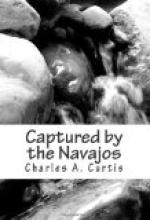When the boys and I started to ride out of camp we were, for a few moments, on the flank of the infantry company. It was noticeable that although the men were marching at “route step,” when they are not required to preserve silence, few of them spoke, and very rarely, and they moved quite slowly. Corporal Henry, at the end of a prolonged yawn, asked, “Are we going to start at this hour every morning, sir?”
“Yes, usually,” I replied.
“How far do we go to-day, Frank?”
“Eighteen miles is the scheduled distance,” answered Frank.
“How fast do men march?”
“Three miles an hour,” said I.
“Then we shall be in camp by ten o’clock. I don’t see the sense of yanking a fellow out of bed in the night.”
“Of course, Henry, there’s a good reason for everything done in the army,” observed Frank, with soldierly loyalty.
“Where’s the sense of marching in the dark when the whole distance can be done in six hours, and the sun rises at five and sets at seven? I prefer daylight.”
Evidently our youngest corporal had not had his sleep out, and was out of humor.
“Will you please explain, sir?” asked Frank.
“With pleasure,” I answered. “It is more comfortable to march in the early morning, when it is cool. Marches rarely exceed fifteen or twenty miles a day, except where the distance between watering-places is more than that. Sometimes we are obliged to march forty miles a day.”
“Seems to me the officers are very tender of the men,” observed the sleepy Henry. “Fifteen and twenty miles a day, and five or six hours on the road, can’t tire them much.”
“Why not try a march on foot, Henry?” suggested his brother. “It might prove a useful experience.”
“Let me suggest something better,” said I. “Tie your pony to the back of that wagon, and crawl in on top of the bedding and have your nap out.”
Henry disdained to reply, but with a long and shivering yawn relapsed into silence.
In a little more than six hours we reached the Rio Puerco, and forded its roily, brackish current to a camping-place on the other side. Harry, who with daylight and warmth had recovered his good-humor, examined the odometer and reported the distance travelled to be 18.65 miles. He entered in his note-book that the Spanish name Puerco meant, as a noun, hog, and as an adjective, dirty. He thought the river well named. He also mentioned that on the eastern side of the stream there was an excellent camping-place, but that much pains had been taken to ford it to a very poor one. After pondering this apparently unreasonable movement he asked: “Why did we not camp on that grassy park on the opposite side?”
“I suppose it appears to you there can be no good reason for crossing to this side?” I asked, in reply.
“It does seem even more absurd than starting on a march just after midnight—something like going into a wood-shed to rest on a wood-pile when one could as well go into a parlor and rest on a divan.”




